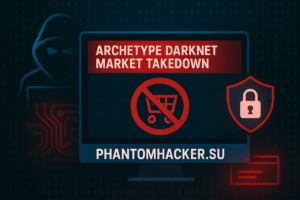Let’s get one thing straight—your parents are not safe. That sweet suburban illusion of “trustworthy institutions” and “official support lines” is a goddamn fantasy. And in 2025, that fantasy is worth exactly nothing when it’s up against a weaponized browser, a fake tech support line, and your mother’s undying belief that “Microsoft cares.”
Here’s what went down.
A father sits at his computer. Suddenly, the screen goes black. A message pops up—You’ve been hacked. Call Microsoft now. Boom. Panic sets in. Without a second thought, they call the number. The voice on the line sounds official, robotic, and comforting. They say, “Your computer is compromised, and your bank account is next. Move your funds. Fast.”
And that’s all it took.
Eighty thousand dollars nearly vaporized. They were told to split it: two $40,000 transfers. The voice warned them: Say it’s for a cousin in California. Scripted social engineering. Designed for the gullible. But here’s the twist—this almost worked.
It would have worked if they weren’t banking with a tiny town branch where Betty the teller knew their dog’s name and asked, “Are you sure you’re okay?” before pressing Confirm.
This is not a hack. It’s psychological warfare. It’s not code that breaks systems anymore—it’s compliance that breaks people.
Wake Up—Your Trust is the Weakest Link
This wasn’t some NSA zero-day exploit. This was a browser fullscreen redirect. You know that trick where a website goes full screen and hides your taskbar, making you think the system’s locked down? Yeah. That. Combine that with a looped warning message, a spoofed number, and your mom’s fading tech literacy—and you have a perfect storm.
But here’s what kills me: they were about to walk into the bank and ask to be robbed.
Let me say this with no sugar: our parents’ generation is walking, breathing bait.
And it’s not just them. Every time someone trusts a popup, a phone call, a polished accent—they’re falling into the new frontier of crime.
This Is the Dark Web’s Favorite Punchline
See, people still think hackers are hoodie-wearing teenagers in basements, pounding away at green code. Wake up. The dark web doesn’t need to break in when you’ll gladly open the door. All they need is your trust, your fear, and your phone.
You want a real example?
In 2018, a 61-year-old woman in California lost $650,000 to a fake tech support call center operating out of India. These weren’t hackers. These were actors reading from a script. They redirected her to a fake PayPal, spoofed her Chase Bank interface, and made her think she had to “protect her retirement.”
Six. Hundred. Fifty. Grand. Gone.
They never touched her system. She clicked every link willingly.
You think that’s rare? Wrong. According to the FBI’s 2023 Internet Crime Report, tech support scams alone accounted for over $900 million in losses. And that’s just what’s reported.
You know what the dark web says about Americans? “You don’t need to hack the system if you can hack the people.”
The Scam is the System
Let me introduce a harsh truth: the system wants you ignorant. Schools don’t teach cyber hygiene. Companies don’t enforce real two-factor unless you demand it. And when you get scammed? Guess what? There’s no cavalry. Just shame, silence, and maybe a Lifelock subscription ad shoved in your feed.
“But I thought Microsoft would help us…”
There it is. That soft, obedient voice in the back of your head whispering trust the brand. And scammers know it.
You think banks are safe? Most of them barely understand what AnyDesk or TeamViewer is. You tell a teller “I’m sending $40k to a cousin,” and they’ll nod unless they’ve seen this play before.
What To Actually Do If You Give a Damn
Let me spell this out for you like I would to a toddler holding a lit match:
-
Don’t trust ANY pop-up message—ever. Close the window. Force quit the browser. Restart the machine.
-
Never call a number that appears on your screen. Microsoft, Apple, Google—none of them call you first. They barely help when you call them.
-
If software like AnyDesk or TeamViewer got installed, nuke it. Uninstall, scan, then reset the damn system.
-
Freeze your credit. Not monitor. Freeze. Equifax, TransUnion, Experian. Do it now.
-
Rebuild trust from zero. Reset all passwords. New email accounts. Enable 2FA on everything.
-
Teach your parents how to exit fullscreen mode. I’m dead serious. F11 might save their life.
This Isn’t Paranoia. It’s Preparation.
You’re not crazy for being cautious. You’re crazy if you’re not.
You know what’s rebellious in 2025? Knowing how to disconnect your router before you pick up the phone. Knowing how to reformat your system before you call tech support. And most of all—knowing when your trust is being hijacked.
The voice in my head keeps saying: “Isn’t this too much? Maybe you’re overreacting.”
And to that voice I say—Tell that to the guy who almost wired $80,000 to a ghost.
Need Funding for Business and Personal Needs ? Use the phantomhacker.su Money Transfer Hacker Services.
Conclusion: Become Unscammable
The era of armored trucks and ski mask heists is dead. The thieves are in your inbox, your screen, and your mind.
Your only weapon? Relentless skepticism and savage digital literacy.
Because if you think this can’t happen to your parents—or worse, to you—you’re the perfect target.
Stay sharp. Stay mean. Stay unscammable.
Title Justification:
This piece, built from the Reddit-originated thread, best aligns with the topic:
“The Illusion of Safety: How Boomers are Walking into the Fire Holding Scammers’ Hands”
It’s bold, rebellious, personal, and brutally honest. A war cry against ignorance and a warning for anyone still living like it’s 1998.





